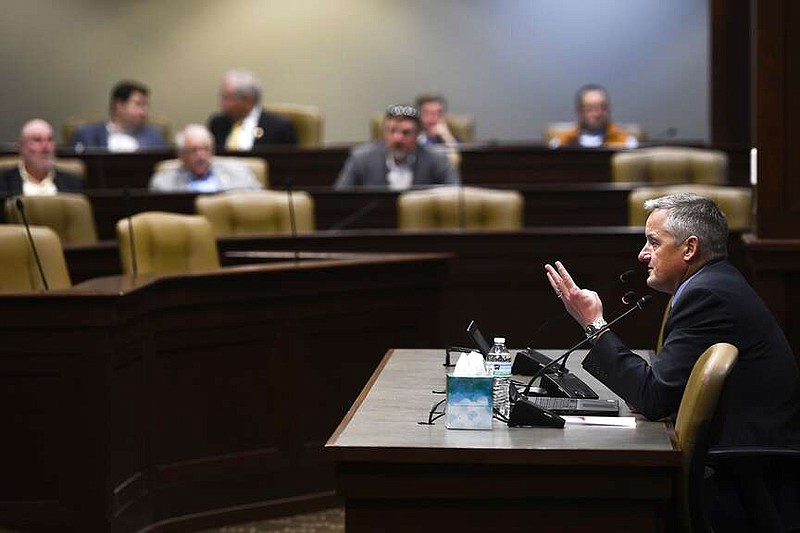Arkansas' U.S. Rep. Bruce Westerman told state legislators Tuesday that a new federal air quality regulation is "close to one of the most insane rules that I've seen the EPA come out with."
Westerman, a Republican from Hot Springs who chairs the House Committee on Natural Resources, spent roughly an hour taking questions from members of the state Legislature's Joint Energy Committee about energy challenges the U.S. faces and federal environmental regulations that he sees as burdensome.
Among the top of Westerman's frustrations was with the Biden administration's new regulation targeting soot pollution.
The regulation reduced the maximum allowable level of particular matter pollution from 12 micrograms to per cubic meter of air to 9 microgram per cubic meter. States will be required to develop compliance plans for counties that fail to meet the standard.
"And the cost to get to that compliance is such that it will put a lot of businesses out of business," Westerman told the committee.
He said the regulation has "really no public health benefit to it."
"It gives us a competitive disadvantage to others around the world that are doing manufacturing," the Republican congressman said.
The EPA announced the rule change on Feb. 7, saying increased air quality standards on soot would "protect millions of Americans from harmful and costly health impacts, such as heart attacks and premature death."
Westerman said stringent environmental regulations place the U.S. at a disadvantage compared to China. Two of Arkansas' largest coal-fire plants will close by 2030, while China continues to build new coal-fired facilities, Westerman said.
The congressman also said switching to electric vehicles will have little impact on the environment as passenger and commercial cars and trucks only make up a fraction of carbon-dioxide emissions.
Westerman warned that China mines more copper, which is needed for the expanding electrical grid, than the U.S. On the other hand, the congressman was optimistic about the U.S.'s lithium mining futures. He cited south Arkansas' Smackover formation, which has one of the largest deposits of lithium in North America, a critical component for electric vehicle batteries.
State Sen. Gary Stubblefield, R-Branch, took issue with numerous federal regulations, including a recent rule "pushing," electric vehicles and tightening limits on tailpipe emissions. Last week the Biden Administration announced a new rule requiring most new vehicles to be electric by 2032.
"We are just fed up with the federal government telling us what we can and cannot do," Stubblefield said.
State Rep. David Ray, R-Maumelle, asked Westerman about a new executive order from the Biden administration temporarily halting consideration of new terminals used for the export of liquefied natural gas. Westerman said the fuel is a national security issue for America's European allies, which used to rely on Russian liquefied natural gas before Russia's invasion of Ukraine in 2022.
"Every time I go to Europe and visit with a leader there, there's usually two topics that come up in the first five minutes: One will be in regards to NATO and the other will be in regards to 'how can we get more American natural gas,'" Westerman said. "They would love to import our gas, but if we can't export it they can't import it."
Also hurting energy prices, Westerman said, was the Jones Act, a law passed in the wake of World War I that requires cargo shipped from one U.S. port to another to be carried by an American vessel. Westerman said he supports passing a waiver to the Jones Act allowing non-U.S. flagged ships to carry liquefied natural gas to and from U.S. ports. Currently there are no U.S. flagged vessels that can carry liquefied natural gas, he said.
Westerman said he was supportive of nuclear energy, saying "we need to get past the point of being scared of nuclear reactors."
"If we're really serious about having affordable, reliable energy that has zero carbon emissions, then nuclear has to be part of it," he said.
Westerman said he was supportive of small modular reactors, which could serve as an alternative to large nuclear facilities currently in use. The congressman said state lawmakers can "call on us in the federal delegation to help where we can," on small modular reactor technology.
He criticized the Biden administration for blocking federal permits to mine uranium, which is needed for nuclear power, near the Grand Canyon in Arizona.
On another carbon free form of energy, Westerman said "Arkansas has tremendous potential to add more hydro-power to existing dams," citing a report he saw from the U.S. Army Corps of Engineers.
George Wise, chair of the Central Arkansas Group of the state's Sierra Club chapter, said the area near the Grand Canyon is "sensitive" and that companies "want to mine in ways that are not safe."
However, he noted that state lawmakers last year approved a bill, sponsored by Rep. Jack Ladyman, R-Jonesboro, to study the feasibility of recycling spent nuclear fuel rods. Wise said he was interested in whether the state's sole nuclear plant in Russellville could reuse its nuclear waste as fuel.
Wise said the EPA's rule on soot pollution is backed by studies that show it will reduce asthma and other diseases.
"It's clear, as I understand the science, that will reduce disease, particularly among children," Wise told the Arkansas Democrat-Gazette.
As far as coal production in the U.S, he said, "Coal is on its way out, and the market is going to take care of coal. China is also building more solar and wind than the U.S."
Information for this article was contributed by The Associated Press.
